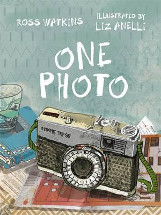One photo by Ross Watkins

Ill. by Liz Anelli. Penguin, 2016. ISBN 9780670077977
(Age: 7+) Highly recommended. Dementia. Family. Mental illness. When
Dad comes home with a camera, one of those old cameras that takes
film which needs to be developed, the family, Mum and their son,
watch on. He seems to be taking photos of things which have no
inherent interest. There are no people in them, they are of things
and places around the house. Photos of his study, of the table at
breakfast time, his coffee cup, the clothesline, the bus shelter. He
takes roll after roll of film to the developer in the city, bringing
the photos home to stick on the window.
The boy and his mum ask him why he doesn't take photos of them, but
he doesn't answer.
They find that he has put things in the cupboard that shouldn't be
there, and puts the hammer in the fridge, so the reader begins to
understand that this man is showing signs of dementia.
More photos appear, until one day he comes home without the camera.
Then he is no longer there. The family receives a parcel in the post
with his camera in it and one undeveloped film. On getting it
developed they see what he was trying to show them, the family he
wants them to remember.
This poignant tale of a family coping with dementia will resonate
with many children in the class or at home. They may have an older
relative with signs that this disease is taking its toll, or may
have seen it in someone younger, the book showing that there is no
age barrier to this disease.
The illustrations are wonderful, showing the family in their house
and all the things which will remind them of their missing father
and husband. All around the house are things which he used and the
photos of things important to him alongside the photo of him with
his family.
There is a growing number of books with this theme for classes and
children to begin discussions about this disease: Newspaper
hats (Phil Cummings) Forgetting
Foster (Dianne Touchell) Wilfred Gordon McDonald
Partridge (Mem Fox) to name a few.
This wonderfully emotive book about one family and the coping
measures undertaken by the father will resonate with some children
and educate others about this disease.
Liz Anelli's wonderful illustrations give the reader a different
view of the family and its worries. The first endpaper shows the
family in its beginnings, Dad's childhood, meeting Mum, marriage and
children, while the last endpaper shows the things he photographed
in the home, his very personal collection of things he thought would
remind them of him. Time passes as shown in the roof top view of the
house and garden, the tree in leaf at the start and later, when he
is not there, it is bare. And I love the page when he has gone: the
afternoon shadows creeping over the furniture with the photos
displayed on top, across the carpet. I could have cried. Anelli's
beautiful, touching illustrations augment this poignant story of one
family's grief.
Fran Knight